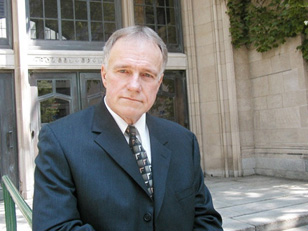Gordon (Randy) Steidl

Randy Steidl at Northwestern Law (Photo: Jennifer Linzer)
Steidl's exoneration pushes error rate in Illinois capital cases to more than 6%
Gordon (Randy) Steidl was released from the Illinois Correctional Center at Danville on May 28, 2004, making him the eighteenth person to be exonerated and released after having been sentenced to death in Illinois since 1977.
His release, ordered earlier the same day by the Edgar County Circuit Court, was based on new evidence that he and co-defendant Herbert Whitlock were innocent of the murder of newlyweds Karen and Dyke Rhoads, whose bodies were discovered on July 6, 1986, in their burning home in Paris, Illinois.
Both convictions rested principally on the testimony of two alcoholics, Deborah Reinbolt and Darrell Harrington, who claimed to have been present when Steidl and Whitlock repeatedly stabbed the victims and set their home afire. Reinbolt was charged with concealing the homicidal deaths and, pursuant to a plea agreement, pleaded guilty. She was sentenced to two years in prison.
The evidence against Steidl also included the testimony of a jailhouse informant, Ferlin Wells, who claimed to have heard Steidl say that, if he had known Harrington would come forward, "he would have definitely taken care of him."
After losing their state appeals, Steidl and Whitlock filed petitions for federal writs of habeas corpus. Whitlock did not prevail, but on June 17, 2003, U.S. District Court Judge Michael McCuskey found in the Steidl case that "acquittal was reasonably probable if the jury had heard all of the evidence." On the ground that Steidl's trial attorney, S. John Muller, failed to pursue exculpatory evidence, Judge McCuskey ordered the state to retry or release Steidl within 120 days.
Madigan promptly filed notice that she would appeal McCuskey's decision to the U.S. Court of Appeals for the Seventh Circuit. The notice stopped the calendar from running in the case, but it resumed running on March 26, 2004, with Madigan's announcement that she would not pursue the appeal.
Judge McCuskey's decision was the culmination of years of work by numerous lawyers, including Michael Metnick, of Springfield; Kathryn Saltmarsh, of the Illinois Appellate Defender's Office; and Lawrence Marshall, Karen Daniel, and Jane Raley, of the Center on Wrongful Convictions. Investigator Bill Clutter of Springfield also played a major role in the case.
"I met with members of both victims families to inform them of the status of the investigation and my final decision," Madigan said. "This has been a very difficult decision, but it is the right decision based upon the evidence."
At that point, the case returned to the Edgar County Circuit Court, where the Office of the State's Attorneys Appellate Prosecutor dismissed the charges against Steidl on May 28, 2004.
Randy first applied for an innocence pardon in 2002, while Governor Ryan was still in office. He filed a supplemental clemency petition in 2005, after his release from prison, while Governor Blagojevich was in office. Below is Randy's personal plea to Governor Quinn to act on the petition before leaving office in January 2015.

